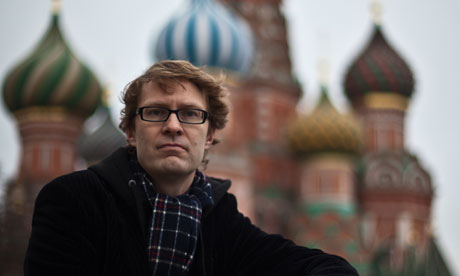
My best friend's office was burgled in an interesting way: the intruders used a ladder to reach the second-floor window and did so in a tightly guarded foreigners-only compound in the heart of Moscow. They took only two laptops (but no cash or other valuables). Perhaps not coincidentally, it happened on the Day of the Chekists.
Chekists were Lenin's secret police, the forerunners both of the KGB of soviet infamy, and of modern Russia's sprawling empire of goons and securocrats. 22 December is their big day, when spooks and ex-spooks drink themselves silly to celebrate their battles against the motherland's foes at home and abroad. They also play practical jokes.
A detective rapidly concluded, however, that "business rivals" were the obvious culprits. Who were they? My friend (the Moscow correspondent for Newsweek) found himself toughly questioned as he tried to stop the police nailing the blame on me (the Economist's then Moscow correspondent and his neighbour).
As Luke Harding's book on his own years in Moscow captures well, life in Russia has not changed much: random inconveniences, bizarre coincidences and maddening interventions leave one confused. Did I really fail to lock the office? Why are there cigarette butts in my loo? Why does my phone battery go flat all the time? Am I going mad – or are they really out to get me?
The incidents mostly comprise petty vandalism, silly stunts (someone left a sex manual in his bedroom) and phones that play back your previous conversation. Vindictive official boneheadedness is more galling. Having been deported from the Soviet Union in 1990, my return in 1998 was not popular with the Russian authorities and they insisted visas would be issued only when our whole family had Aids tests (including my then two-year-old son).
In Harding's case, his accreditation was not renewed and he joins an honour roll of those journalists (chiefly British and American, but also Czech, Danish, Finnish and Hungarian) whose reporting has blighted their visa chances. But as a seasoned and versatile foreign correspondent, he can move on to another posting. For specialists, a visa ban is a career-killer.
At least it was only his pride and peace of mind that suffered. Russian journalists who displease the authorities get maimed or murdered. Shortly after the Newsweek burglary, a British colleague was beaten unconscious in the pedestrian underpass near our offices. A random attack? Probably (though he was not robbed). But even the bravest of us felt a trifle nervous afterwards.
More often, Russia's officialdom is bumbling rather than sinister. Our dacha garden, a few miles out of Moscow, adjoined a barracks and was near the control bunker for the city's missile defences. In the corner near the raspberry bushes was a mysterious rusty manhole cover. We barely noticed it until one day two men in boiler suits climbed out, revealing a cavernous tunnel. They complained crossly about bad ventilation, smoked cigarettes and descended.
A potential criticism of Harding's book is that he takes the FSB (the main successor to the KGB) so seriously. Teasing or ridicule is the best answer to their provocations (in Soviet days, we would enter hotel rooms with a cheery "Raz, dva, try [one, two, three] – Good evening, Comrade Colonel, can you hear me?"). As Harding rightly notes, the FSB's world is dismally ignorant and paranoid. That should arouse more pity than fear: like all bullies, if they've riled you, they've won. But pure sang-froid would not have spawned this entertaining and alarming account of Vladimir Putin's police state.
The authorities can even have a sense of humour: as the Lucas family possessions followed us out of Moscow, various bits of journalist hardware (a solar-powered satellite-phone charger, a shortwave radio antenna) went missing. When we opened the packing cases we found that in their place someone had put an ancient set (in English) of Ian Fleming's James Bond books. Russian officials assume that all British correspondents work for MI6; this was presumably a kind of collegial salute.
We will probably never know how many of Harding's misfortunes were staged to intimidate him and his family, and how many were just random bumps in the Russian road. Nor is it clear what he did to so annoy the authorities. His reportorial talents capture colour and character to illustrate demographic decay, the war in Georgia and the noxious world of the thuggish pro-Putin youth movements. But these are not state secrets. Putin's personal wealth (another good story) is taboo in Russia's mainstream media, but much discussed elsewhere.
More sizzling were his pieces (now chapters) drawn from WikiLeaks. It is nice to know that American diplomats are such diligent and caustic observers of Russia's slide into what Harding rightly calls a "mafia state". It is a pity that their political masters in Washington, DC ignore what they are told. With Putin set to be in charge for 12 more years, it is high time that the outside world woke up to the true nature of the system he has created: astonishingly corrupt and incompetent, and also (as the Hardings discovered) thuggishly xenophobic.
Edward Lucas is the author of The New Cold War: How the Kremlin Menaces Both Russia and the West (Bloomsbury)

